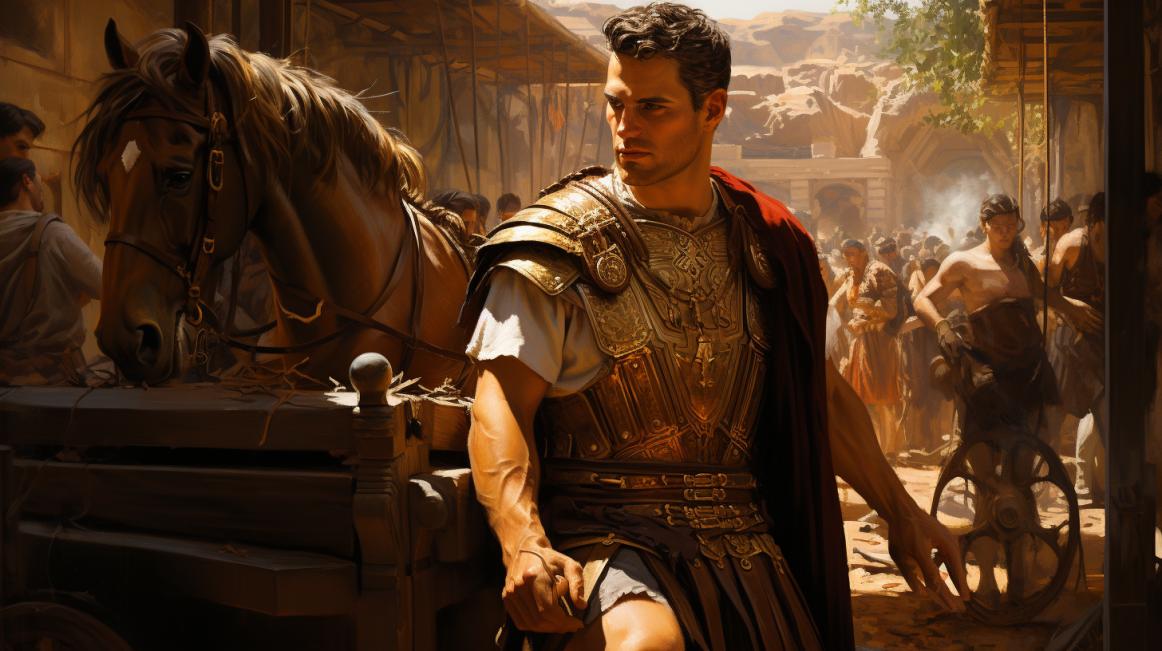Ariadne in Greek Mythology: The Enchanting Tale of Love, Betrayal, and Immortality

Ariadne in Greek Mythology is a captivating tale of love, betrayal, and immortality. Daughter of King Minos of Crete, Ariadne fell in love with the Athenian hero Theseus and aided him in escaping the labyrinth by providing him with a thread.
Some versions of the myth reveal her subsequent marriage to Dionysus, the god of wine, while others depict a tragic end. This article explores various aspects of Ariadne’s story, including the significance of her thread, her relationship with Dionysus, and her enduring legacy in art and culture.
Ariadne Pronunciation
The pronunciation of ‘Ariadne’ in Greek Mythology might vary depending on regional accents and preferences. However, in the American English variant, the general pronunciation is as follows:
Pronunciation of ‘Ariadne’ in Greek Mythology
In American English, ‘Ariadne’ is commonly pronounced as:
- air-ee-ad-nee
Each syllable has equal stress, and the vowels are pronounced as follows:
- ‘A’ is pronounced as ‘air’ (similar to the ‘a’ in ‘airplane’).
- ‘i’ is pronounced as ‘ee’ (similar to the ‘ee’ in ‘see’).
- ‘ad’ is pronounced as ‘ad’ (similar to the ‘a’ in ‘advice’).
- ‘ne’ is pronounced as ‘nee’ (similar to the ‘nee’ in ‘knee’).
This pronunciation guide aims to provide a general understanding of how ‘Ariadne’ is typically pronounced in the context of Greek Mythology, according to the American English variant.
Ariadne Thread
The Ariadne thread holds great significance in Greek mythology, particularly in the story of Theseus and the Minotaur. This section explores the importance of Ariadne’s thread and how it played a crucial role in helping Theseus escape the treacherous labyrinth.
The Significance of Ariadne’s Thread
At the heart of the myth, Ariadne’s thread symbolizes guidance and salvation. It represents a lifeline for Theseus, providing him with a way to navigate the perplexing maze. The thread serves as a tangible connection between Ariadne’s unwavering love and Theseus’ hope for survival.
The thread’s significance goes beyond its practical use as a pathfinder. It represents the power of love and loyalty, offering Theseus a sense of comfort and assurance amidst the labyrinth’s darkness and danger.
Ariadne’s thread becomes a symbol of hope, guiding the hero towards victory and ensuring his safe return.
How Ariadne’s Thread Helped Theseus Escape the Labyrinth
When Theseus entered the labyrinth to confront the fearsome Minotaur, Ariadne provided him with a ball of thread. She instructed Theseus to unwind the thread as he advanced, allowing him to retrace his steps and find his way back out.
As Theseus ventured deeper into the maze, he unraveled the thread behind him, ensuring a clear path for his exit.
Ariadne’s ingenious plan proved successful. Armed with the thread, Theseus defeated the Minotaur and emerged from the labyrinth unscathed.
The thread became a crucial tool, guiding Theseus through the intricate passages and leading him to his ultimate victory.
- Theseus relied on Ariadne’s thread to navigate the labyrinth.
- Unwinding the thread allowed Theseus to retrace his steps and find the way out.
- Ariadne’s thread provided Theseus with a clear path to victory.
Thanks to Ariadne’s selflessness and her thread’s guidance, Theseus escaped the labyrinth, fulfilling his heroic quest and preserving his life.
The thread’s role in assisting Theseus showcases Ariadne’s resourcefulness and her determination to aid her beloved.
Truly, Ariadne’s thread stands as a symbol of hope, love, and the triumph of perseverance in the face of adversity.
Ariadne and Dionysus
Ariadne and Dionysus intertwine in a captivating love story that is both magical and tragic. Their union is a tale of passion, devotion, and divine intervention. As the god of wine and revelry, Dionysus was drawn to Ariadne’s beauty and spirit.
Their love blossomed in the aftermath of Ariadne’s abandonment by Theseus on the island of Naxos. Dionysus discovered Ariadne, broken-hearted and alone, and took her as his wife, showering her with love and immortality.
The Love Story of Ariadne and Dionysus
Ariadne found solace in the arms of Dionysus, who embraced her with warmth and affection. He saw the strength in her vulnerability and welcomed her into his divine realm.
Their love was passionate and all-encompassing, united by shared experiences of heartache and resilience. Dionysus, known for his wild celebrations and ecstatic revelry, found a kindred spirit in Ariadne, who brought a balance of stability and sensuality to their relationship.
Together, Ariadne and Dionysus reveled in their love, frolicking through vineyards and dancing under moonlit skies. They celebrated life and explored the boundaries of joy and ecstasy, leaving behind the pain of their pasts.
Their love became a source of inspiration for artists, poets, and dreamers alike, who sought to capture the essence of their divine romance.
Dionysus’ Role in Ariadne’s Fate
Dionysus played a pivotal role in shaping Ariadne’s fate. Some versions of the myth suggest that Dionysus made Ariadne immortal, elevating her to the realm of the gods.
In this divine union, Ariadne found everlasting joy and eternal life, escaping the pain and heartbreak of mortal existence. Dionysus, with his power and influence, ensured that Ariadne’s story would not be forgotten, cementing her place as a beloved figure in Greek mythology.
However, the whims of the gods are fickle, and even divine love does not guarantee eternal happiness. Despite Dionysus’ devotion, the shadow of Ariadne’s past lingered. The tragedy of her abandonment by Theseus haunted her, reminding her of the cruel uncertainties of mortal love.
Dionysus, despite his efforts to shelter her from pain, could not entirely erase the scars left by Theseus. Ariadne’s story serves as a reminder that even in the realm of gods, love is not without its flaws and complexities.
Ariadne Meaning
The name Ariadne holds deep symbolism and has been subject to various interpretations throughout Greek mythology. It is believed to have ancient Cretan roots and can potentially mean ‘more’ and ‘sacred’.
Some scholars have also suggested that Ariadne’s name might have originated from the pre-Greek Minoan civilization, serving as a borrowed word.
The Symbolism and Interpretation of Ariadne’s Name
Ariadne’s name carries significant symbolism within Greek mythology. The element ‘more’ suggests her association with abundance, excess, or even superiority. This could reflect her role as a powerful figure, possessing knowledge of the labyrinth and providing Theseus with the means to conquer the Minotaur.
The element ‘sacred’ in Ariadne’s name alludes to her divine connections and spiritual significance.
It implies her role as a bridge between mortal and divine realms, intertwining with the worlds of gods and humans. Additionally, the sacredness in her name can reflect her status as a revered figure, embodying qualities of wisdom, guidance, and protection.
The interpretation of Ariadne’s name showcases the layers of meaning and depth she holds within Greek mythology. It further emphasizes her importance as a central character, whose actions and presence shape key events and themes in the stories surrounding her.
Other Greek Myths and Gods Related to Ariadne
Ariadne’s story is intertwined with other Greek myths and gods, adding depth and complexity to her narrative.
The Myth of Theseus and the Minotaur
One of the most famous myths involving Ariadne is the tale of Theseus and the Minotaur. Theseus, an Athenian hero, was sent to Crete to confront the fearsome Minotaur, a half-man, half-bull creature.
With Ariadne’s help, Theseus successfully navigated the labyrinth and defeated the Minotaur. This myth showcases Ariadne’s pivotal role in aiding Theseus and her significance in the hero’s ultimate triumph.
Ariadne’s Family: King Minos and Pasiphae
Ariadne’s familial background is equally intriguing. She was the daughter of King Minos, ruler of Crete, and his wife Pasiphae. King Minos was known for his power and his demand for sacrifices to appease the gods.
Pasiphae, on the other hand, infamously fell in love with a bull and gave birth to the Minotaur, the very creature Theseus had to face. Ariadne’s connection to these influential figures adds layers of complexity to her own story.
These myths and gods associated with Ariadne shed light on her role as both a protagonist and supporting character in Greek mythology. They offer insight into her lineage, her involvement in heroic quests, and the larger tapestry of Greek storytelling and pantheon.
Exploring these interconnected narratives deepens our understanding of Ariadne’s significance in Greek mythology and the enduring impact of her tale.
Ariadne in Art and Ancient History
Artists throughout ancient history found inspiration in the captivating story of Ariadne, bringing her to life through various artistic representations. These artworks not only showcased Ariadne’s beauty but also captured the essence of her connection with Dionysus and her involvement in the labyrinth.
Ariadne’s Representation in Ancient Art
In ancient art, Ariadne was frequently depicted alongside Dionysus, surrounded by his followers, such as satyrs and maenads. These portrayals emphasized her status as the wife of the god of wine and celebrated her role in the mythological tale of Theseus and the Minotaur. Artists carefully crafted Ariadne’s image, reflecting her beauty, grace, and authority.
Ariadne was often represented wearing a diadem, symbolizing her significance and noble lineage. Additionally, her influence extended to the celestial realm, with her wedding diadem transformed into the Corona Borealis constellation in the night sky, forever immortalizing her in the stars.
The Influence of Ariadne’s Story in Ancient Culture
Ariadne’s myth had a profound impact on ancient culture, encompassing not only art but also literature, theater, and religious festivities. Her story served as a source of inspiration for poets, playwrights, and philosophers, who explored themes of love, betrayal, and the complexities of human relationships.
- Playwrights, such as Euripides, incorporated Ariadne’s character in their plays, delving into her emotional journey and the consequences of her ill-fated love for Theseus.
- Philosophers contemplated the symbolism of Ariadne’s thread, using it as a metaphor for the guiding force that leads individuals through the labyrinthine challenges of life.
- The mythological tale of Ariadne also found its place in religious festivities, with festivals held in her honor in Cyprus and Naxos.
These celebrations highlighted her important role in Greek mythology and showcased her enduring impact.
The influence of Ariadne’s story persisted throughout ancient history, leaving an indelible mark on the cultural landscape of the time.
Her portrayal in art and her exploration in various art forms immortalized her legacy, ensuring that her story would continue to captivate and inspire generations to come.
Festivals and Honors for Ariadne
Festivals and celebrations in honor of Ariadne are held in Cyprus and Naxos, two locations deeply connected to her mythology and legacy.
These events pay homage to Ariadne as an important figure in Greek mythology, recognizing her contributions and significance in the ancient tales.
Celebrations in Cyprus and Naxos
In Cyprus, the festival of Ariadne, known as the “Ariadneia,” is a vibrant celebration filled with music, dance, and theatrical performances. The festivities often take place in Larnaca, where Ariadne is believed to have been born.
Locals and visitors gather to honor Ariadne through reenactments of her life and mythological stories, showcasing the enduring impact of her tale.
On the island of Naxos, the birthplace of Dionysus, the festival of Ariadne, called “Dionysia,” is also celebrated with great enthusiasm.
Naxos holds a significant place in the Ariadne legend, as it was here that she was abandoned by Theseus. The festival features processions, feasts, and performances, paying tribute to Ariadne’s story as an emblem of passion, betrayal, and transformation.
Ariadne’s Legacy and Impact on Greek Mythology
Ariadne’s story has truly stood the test of time, leaving a profound impact on Greek mythology and beyond. The tale of her love, betrayal, and resilience has inspired countless works of art, literature, and music.
She continues to captivate the imaginations of artists and writers, serving as a symbol of both vulnerability and strength.
Artists throughout history have depicted Ariadne in various forms, immortalizing her in sculptures, paintings, and pottery.
Her story has influenced the development of Western art, becoming a subject of fascination for creators seeking to capture the complexities of human emotion and experience.
Ariadne’s legacy extends beyond the realm of art.
Her tale has resonated with individuals around the world, offering lessons on love, betrayal, and the power of personal transformation. Her name and story continue to be referenced in contemporary culture, reminding us of the enduring significance of Greek mythology and its timeless themes.
In Conclusion
The festivals and honors dedicated to Ariadne in Cyprus and Naxos serve as a testament to her enduring presence in Greek mythology. These celebrations preserve her legacy, embodying the enduring impact of her story on art, culture, and the collective human imagination.
Ariadne’s mythological journey continues to inspire and captivate, reminding us of the timeless power and relevance of ancient tales.
.




















